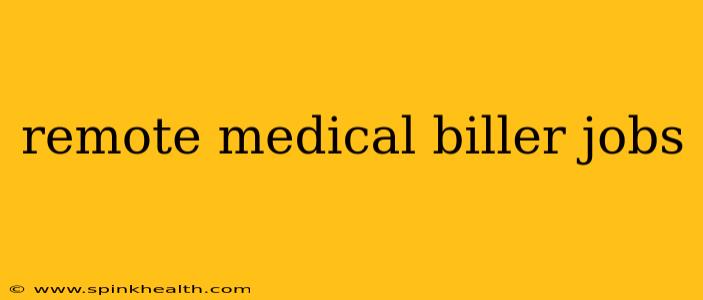The world of healthcare is constantly evolving, and with it, the opportunities for remote work are booming. One such exciting avenue is the field of medical billing, where professionals can leverage their skills to support healthcare providers from the comfort of their own homes. But what exactly does a remote medical biller do, and how can you find your place in this growing industry? Let's dive in.
This isn't just a story about job postings; it's a story about flexibility, empowerment, and making a real difference in the healthcare system. Imagine yourself, working in your pajamas, contributing to smooth operations in a critical part of healthcare, all while enjoying the autonomy of remote work. That's the reality for many remote medical billers, and it could be yours too.
What Does a Remote Medical Biller Do?
A medical biller, whether remote or on-site, is the crucial link between healthcare providers and insurance companies. They are the financial gatekeepers, ensuring that medical practices receive proper reimbursement for the services they provide. Their day-to-day tasks often involve:
- Processing claims: This includes accurately inputting patient and procedure information into billing software, following specific insurance guidelines, and submitting claims electronically.
- Following up on claims: Persistence is key! Billers often need to contact insurance companies to resolve denials, appeals, or outstanding payments. This requires strong communication and problem-solving skills.
- Managing patient accounts: This might involve addressing patient inquiries regarding bills, explaining insurance coverage, and resolving discrepancies.
- Maintaining accurate records: Medical billing demands meticulous attention to detail. Billers must maintain accurate records of all claims, payments, and adjustments.
- Using billing software: Proficiency in various billing software applications is essential. Familiarity with electronic health records (EHR) systems is also frequently required.
What Skills Do I Need for a Remote Medical Biller Job?
While the technical aspects are crucial, the human element is equally important. Success as a remote medical biller relies on:
- Medical billing and coding knowledge: A solid understanding of medical terminology, procedural and diagnostic coding (CPT, ICD), and insurance regulations is non-negotiable. Certifications like Certified Professional Coder (CPC) or Certified Medical Biller (CMB) can significantly boost your prospects.
- Proficiency in billing software: Most practices use specialized billing software, so familiarity with these systems (e.g., Kareo, Athenahealth, Practice Fusion) is a must.
- Excellent communication skills: You'll be interacting with patients, insurance representatives, and medical office staff, requiring clear and professional communication.
- Strong organizational and time management skills: Balancing multiple tasks, meeting deadlines, and maintaining meticulous records are critical.
- Problem-solving abilities: You'll encounter denials and other challenges. The ability to identify the root cause and find solutions is vital.
- Attention to detail: Accuracy is paramount in medical billing to avoid errors and delays in payments.
How Can I Find Remote Medical Biller Jobs?
The search for the perfect remote medical biller position requires strategy. Here are some effective avenues:
- Online job boards: Indeed, LinkedIn, and Monster are great starting points. Use keywords like "remote medical biller," "work-from-home medical biller," and "virtual medical billing specialist."
- Company websites: Many healthcare practices and billing companies actively recruit remote billers. Check the career pages of your target organizations.
- Networking: Connect with people in the healthcare industry. Attend virtual events or join online groups to learn about opportunities and make valuable connections.
- Freelance platforms: Websites like Upwork and Fiverr may offer freelance medical billing gigs, though often for smaller-scale projects.
What are the benefits of working as a remote medical biller?
This isn't just about the paycheck; it's about lifestyle and work-life balance. Many remote medical billers appreciate:
- Flexibility: Set your own hours (within reasonable boundaries, of course) and create a schedule that fits your life.
- Work-from-home convenience: Eliminate commutes, save on gas, and enjoy the comfort of your home office.
- Career advancement: Experienced and skilled billers can progress into supervisory roles or specialize in particular areas.
How Much Do Remote Medical Billers Make?
Salary expectations vary depending on experience, location, and the employer. Entry-level positions may start around $35,000 to $45,000 per year, while experienced billers can earn significantly more. Additional certifications and specialized skills can also command higher salaries.
What are the challenges of working as a remote medical biller?
While the perks are undeniable, it's important to acknowledge potential challenges:
- Isolation: Working from home can sometimes feel isolating. It's crucial to maintain connections with colleagues and foster a sense of community.
- Technology dependence: Reliable internet access and computer equipment are essential. Technical issues can disrupt workflow.
- Self-discipline: Successfully working remotely requires strong self-discipline and time management skills.
The world of remote medical billing offers a fantastic opportunity to blend professional fulfillment with a flexible lifestyle. By honing your skills, networking effectively, and understanding the industry, you can pave your way to a rewarding career in this dynamic field. This isn't just a job; it's a chance to contribute to the healthcare system while shaping your own professional destiny.

